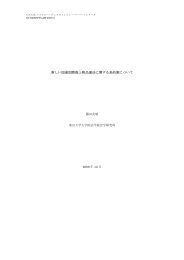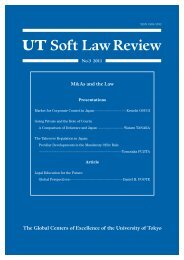UT Soft Law Review
UT Soft Law Review
UT Soft Law Review
You also want an ePaper? Increase the reach of your titles
YUMPU automatically turns print PDFs into web optimized ePapers that Google loves.
<strong>UT</strong> <strong>Soft</strong> <strong>Law</strong> <strong>Review</strong> No.2 2010Comment:Developing Takeover Policy in the United States and JapanCurtis J. MILHAUPT *IntroductionI am honored to have the opportunity to comment on the keynote speeches of Prof. Kandaand Justice Jacobs, two people who have been centrally involved in the development oftakeover law and policy in their respective countries. Five years ago, the Center for JapaneseLegal Studies at Columbia <strong>Law</strong> School co-sponsored a symposium in Tokyo on the poison pill.The lead speakers were Prof. Kanda, Chancellor William Chandler of the Delaware ChanceryCourt, and my Columbia colleague Ronald Gilson. The discussion at that conference wasalmost completely hypothetical. As readers are well aware, in the early 2000s Japan had notyet experienced much hostile takeover activity. Needless to say, no Japanese corporation hadactually adopted a shareholder rights plan. And the courts had issued only a small number ofdecisions on takeover defenses. In the five years since that symposium, as Prof. Kanda hasjust explained in his keynote speech, there have been dramatic developments in the Japanesetakeover market. I am extremely pleased that Columbia <strong>Law</strong> School is once again involved ina major symposium on Japanese takeover law and policy at a key moment in its institutionaldevelopment.I would like to approach the speeches of Prof. Kanda and Justice Jacobs from theperspective of institutional design and the process of institutional change. As the startingpoint for the analysis, note the diversity of takeover policies around the world, as reflected inthese two speeches. Although many scholars have argued for years that we are witnessing“convergence” in corporate law and governance due to globalization and the homogenizingforce of the capital markets, national laws on hostile takeovers and defenses vary greatlyamong highly developed countries.Why do we see such diversity in this key area of economic regulation? Because takeoverpolicy, 1 perhaps to a greater extent than any other are of corporate law, is deeply connectedto a country’s institutional structures, and these structures have proven to be quite resilientin the face of globalization.The question at the center of any country’s takeover policy is “who decides”? Who decides* Professor of <strong>Law</strong>, Columbia <strong>Law</strong> School1 As I will explain below, I use the term “takeover policy” to mean both legal rules and surroundinginstitutions and organizations used to interpret and enforce the rules.28





